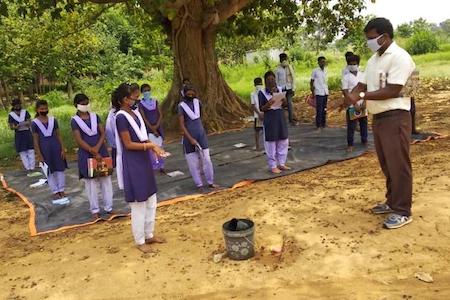
UNICEF is collaborating with the government to put together a communication plan for students, parents and community members to ensure all children go back to school once schools reopen.
Monika Nielsen, Chief of Field Office, UNICEF, Odisha said, “It is very crucial to ensure children continue to learn even as the schools are closed. The ALMP initiative is an innovative move by the government to reach the most marginalized and vulnerable tribal children [*] of Odisha. We are now working on the next steps to make the ALMP initiative stronger and thus support parents and children resume schooling when schools resume classes.”
Source: “Innovative learning programme brings back joy to tribal students in Odisha” by Radhika Srivastava (Unicef India, 9 September 2020)
URL: https://www.unicef.org/india/stories/innovative-learning-programme-brings-back-joy-tribal-students-odisha
Date visited: 7 October 2020
[Bold typeface added above for emphasis]
* This refers to an administrative category for the purpose of government policies: Particularly vulnerable tribal group (PVTG) >>
See also
Adverse inclusion | Casteism | Rural poverty
Demographic Status of Scheduled Tribe Population of India (Census figures 2011)
Fact checking | Figures, census and other statistics
Human Rights Commission (posts) | www.nhrc.nic.in (Government of India)
Search tips | Names of tribal communities, regions and states of India
“What is the Forest Rights Act about?” – Campaign for Survival and Dignity
“Who are Scheduled Tribes?” – Government of India (National Commission for Scheduled Tribes, NCST)
Search tips
Type combinations like “odisha tribe pandemic” in the search field seen below and other Safe search custom engines found on this website
Reports in the Indian press | List of periodicals included in this search >>
Search tips
Combine the name of any particular state, language or region with that of any tribal (Adivasi) community.
Add keywords of special interest (music, poetry, dance just as health, sacred grove and biodiversity); learn about the rights of Scheduled Tribes such as the “Forest Rights Act” (FRA); and the United Nations “Declaration on the Rights of Indigenous Peoples”, “Universal Declaration of Human Rights”, “women’s rights”, or “children’s right to education”.
Specify any other issue or news item you want to learn more about (biodiversity, bonded labour and human trafficking, climate change, ecology, economic development, ethnobotany, ethnomedicine, global warming, hunter-gatherers in a particular region or state, prevention of rural poverty, water access).
For official figures include “scheduled tribe ST” along with a union state or region: e.g. “Chhattisgarh ST community”, “Himalayan tribe”, “Scheduled tribe Tamil Nadu census”, “ST Kerala census”, “Particularly Vulnerable Tribal Group Jharkhand”, “PVTG Rajasthan”, “Adivasi ST Kerala”, “Adibasi ST West Bengal” etc.
In case the Google Custom Search window is not displayed here try the following: (1) toggle between “Reader” and regular viewing; (2) in your browser’s Security settings select “Enable JavaScript” | More tips >>
Note: hyperlinks and quotes are meant for fact-checking and information purposes only | Disclaimer >>
See also
Adivasi Academy & Museum of Adivasi Voice at Tejgadh | Lecture “A View of Higher Education in India”
Appropriate education for Adivasi children – the Vidyodaya School model at Gudalur
Childhood | Children’s books | Childrens rights: UNICEF India | Safe search
People’s Linguistic Survey of India | Volumes (PLSI) | PeoplesLinguisticSurvey.org
Multi-lingual education | Residential school | Ekalavya
Multilingual education is a pillar of intergenerational learning – Unesco
Santali education | Teaching Santal children by Boro Baski
Unesco | Unicef | Unicef India | United Nations
United Nations International Days and Weeks
Video | “Nations don’t make us human – languages make us human”: Ganesh Devy
Women | Safe search | President Droupadi Murmu on women’s empowerment